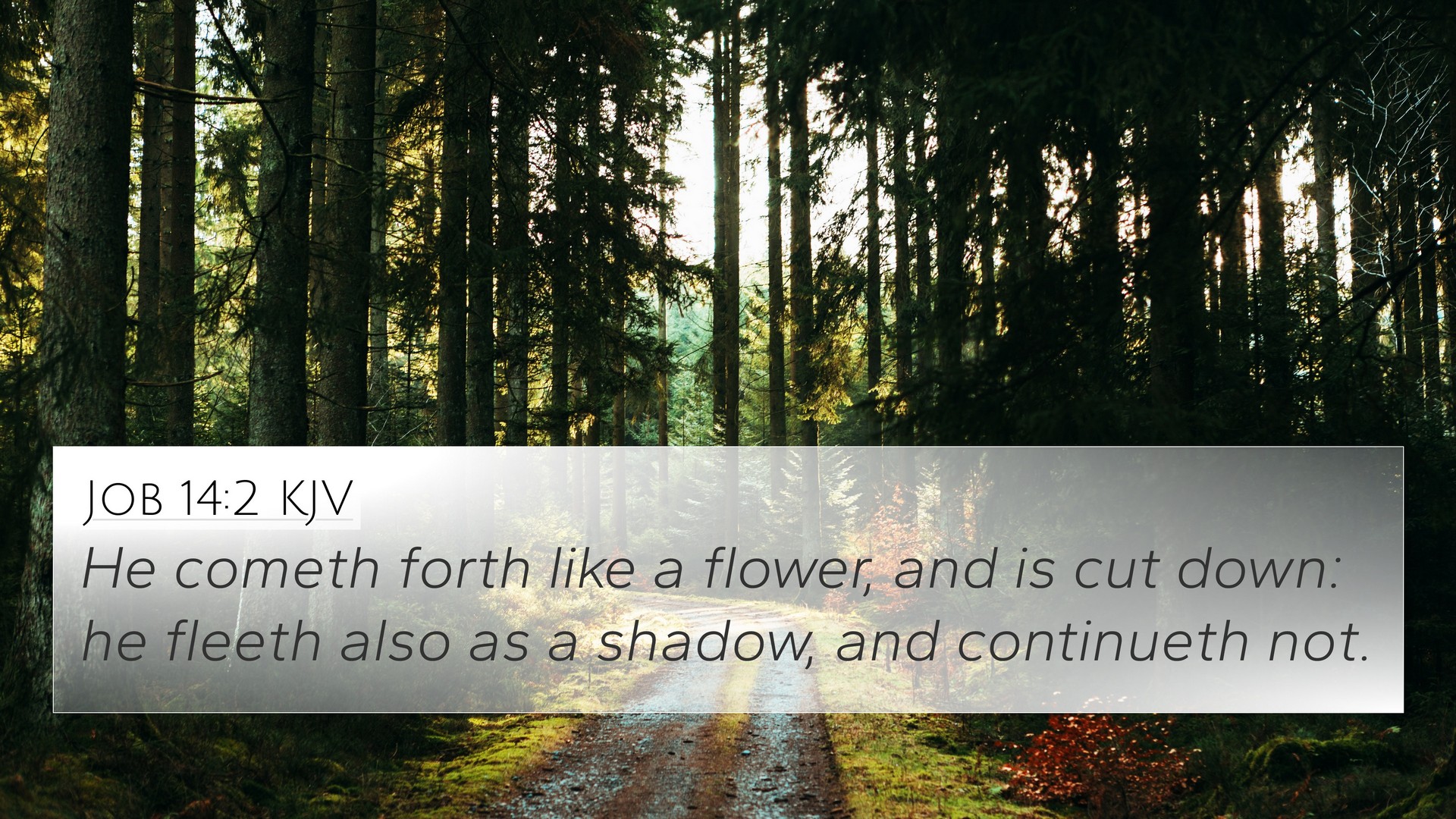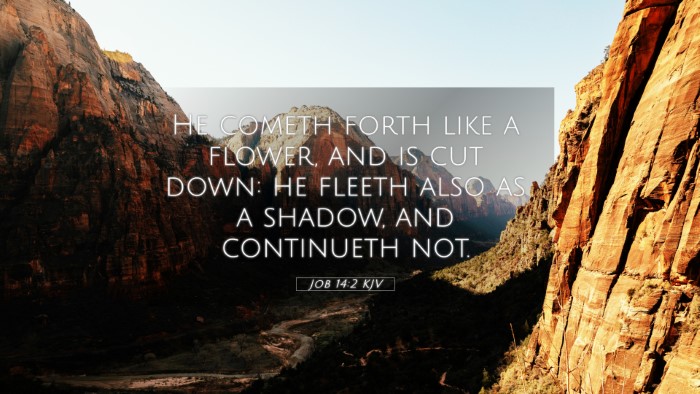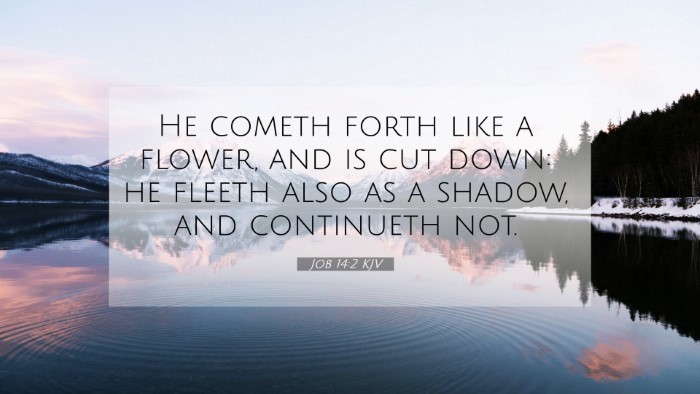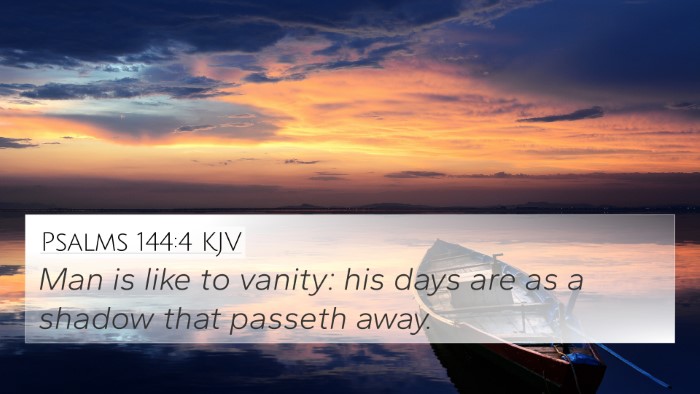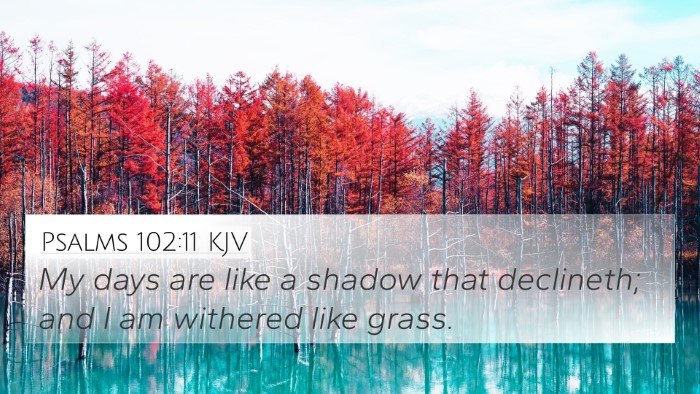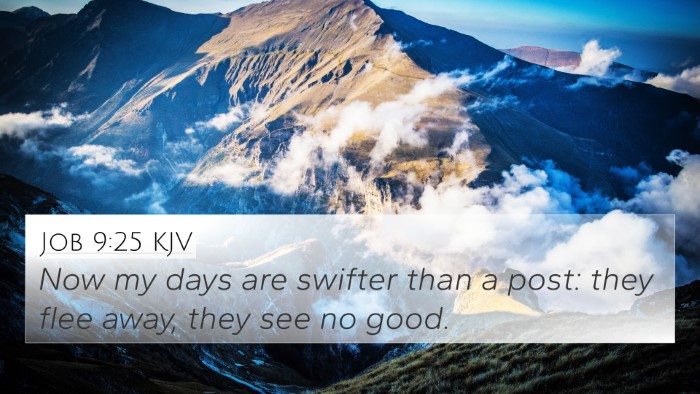Old Testament
Genesis Exodus Leviticus Numbers Deuteronomy Joshua Judges Ruth 1 Samuel 2 Samuel 1 Kings 2 Kings 1 Chronicles 2 Chronicles Ezra Nehemiah Esther Job Psalms Proverbs Ecclesiastes Song of Solomon Isaiah Jeremiah Lamentations Ezekiel Daniel Hosea Joel Amos Obadiah Jonah Micah Nahum Habakkuk Zephaniah Haggai Zechariah MalachiJob 14:2 Similar Verses
Job 14:2 Cross References
He cometh forth like a flower, and is cut down: he fleeth also as a shadow, and continueth not.
Uncover the Rich Themes and Topics of This Bible Verse
Listed below are the Bible themes associated with Job 14:2. We invite you to explore each theme to gain deeper insights into the Scriptures.
Job 14:2 Cross Reference Verses
This section features a detailed cross-reference designed to enrich your understanding of the Scriptures. Below, you will find carefully selected verses that echo the themes and teachings related to Job 14:2 KJV. Click on any image to explore detailed analyses of related Bible verses and uncover deeper theological insights.
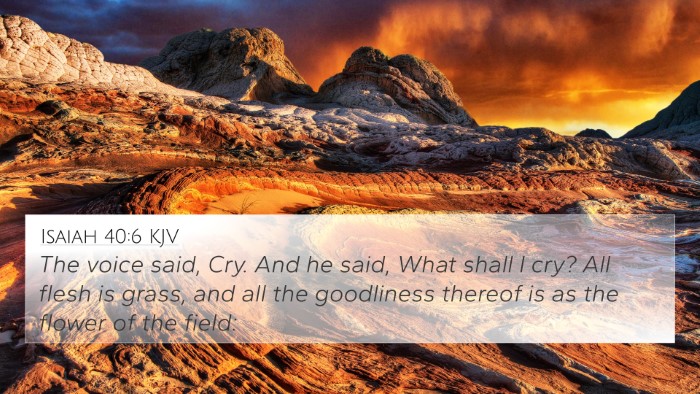
Isaiah 40:6 (KJV) »
The voice said, Cry. And he said, What shall I cry? All flesh is grass, and all the goodliness thereof is as the flower of the field:
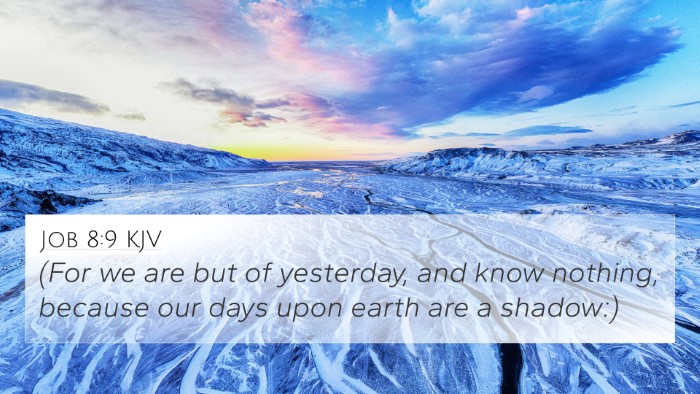
Job 8:9 (KJV) »
(For we are but of yesterday, and know nothing, because our days upon earth are a shadow:)
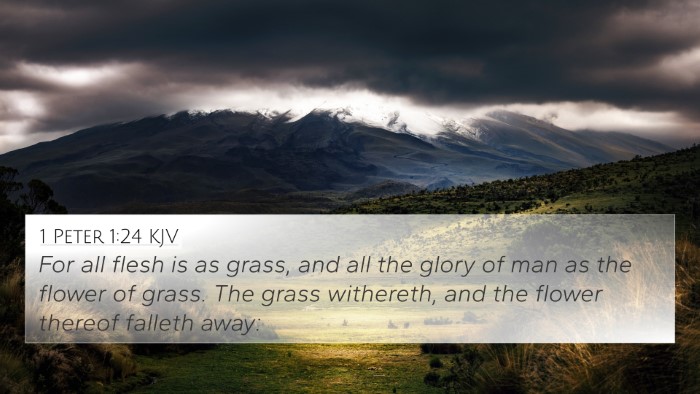
1 Peter 1:24 (KJV) »
For all flesh is as grass, and all the glory of man as the flower of grass. The grass withereth, and the flower thereof falleth away:
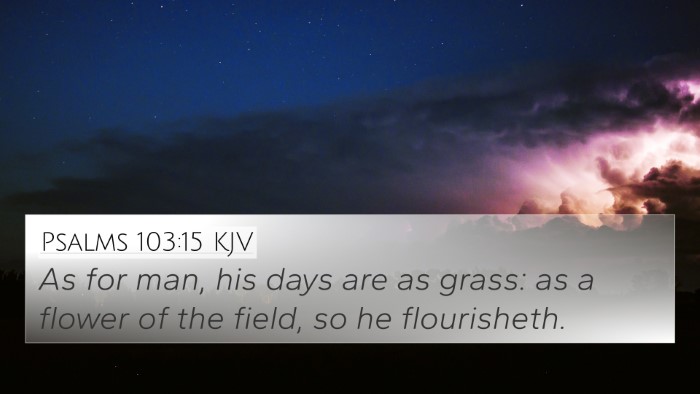
Psalms 103:15 (KJV) »
As for man, his days are as grass: as a flower of the field, so he flourisheth.
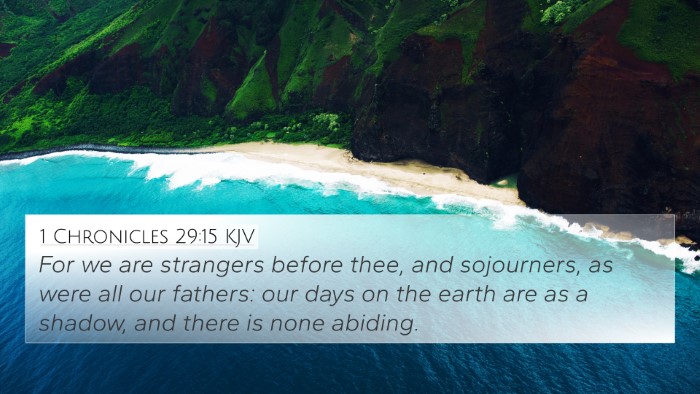
1 Chronicles 29:15 (KJV) »
For we are strangers before thee, and sojourners, as were all our fathers: our days on the earth are as a shadow, and there is none abiding.
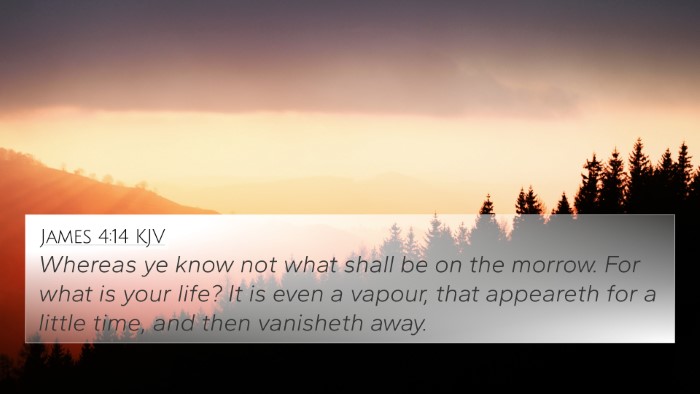
James 4:14 (KJV) »
Whereas ye know not what shall be on the morrow. For what is your life? It is even a vapour, that appeareth for a little time, and then vanisheth away.
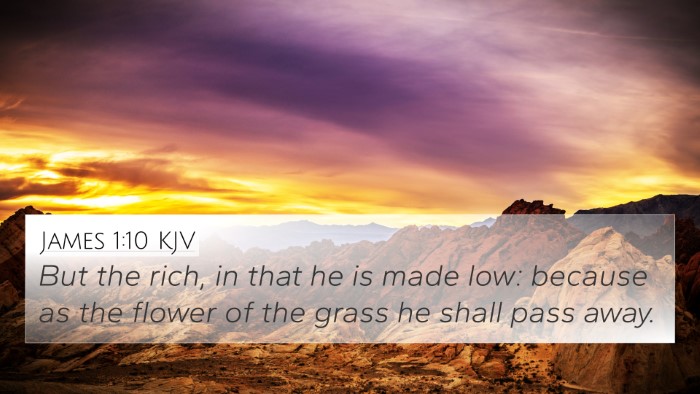
James 1:10 (KJV) »
But the rich, in that he is made low: because as the flower of the grass he shall pass away.
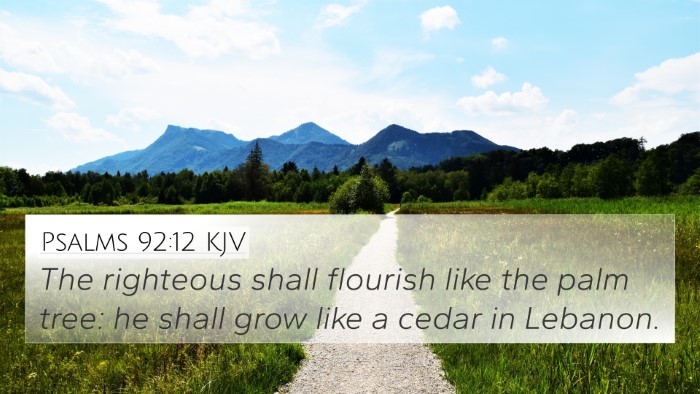
Psalms 92:12 (KJV) »
The righteous shall flourish like the palm tree: he shall grow like a cedar in Lebanon.
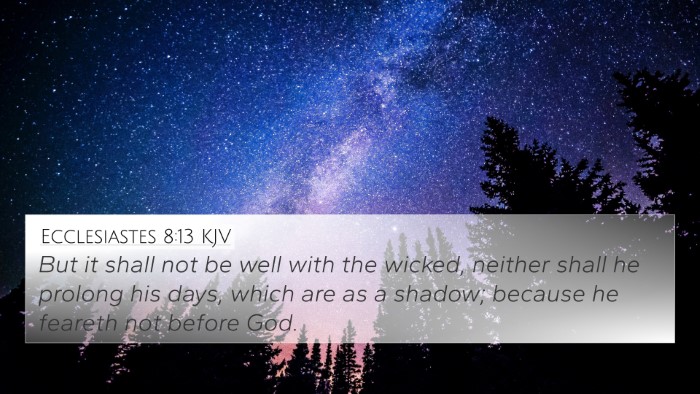
Ecclesiastes 8:13 (KJV) »
But it shall not be well with the wicked, neither shall he prolong his days, which are as a shadow; because he feareth not before God.
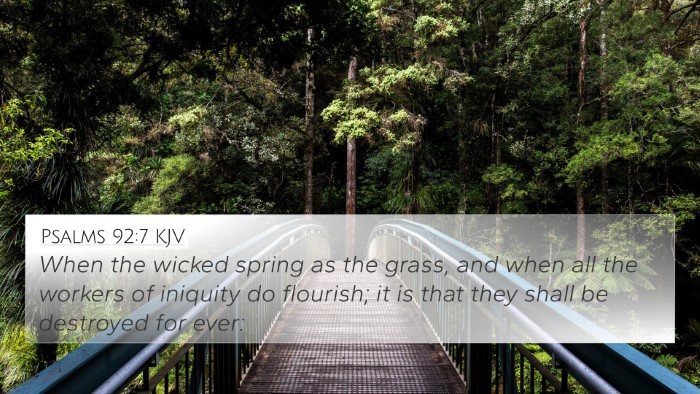
Psalms 92:7 (KJV) »
When the wicked spring as the grass, and when all the workers of iniquity do flourish; it is that they shall be destroyed for ever:
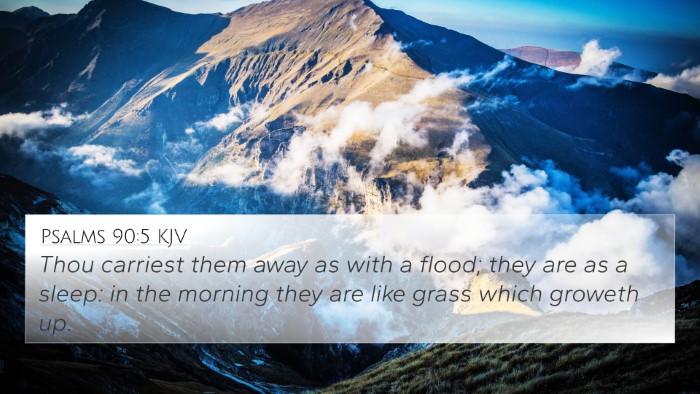
Psalms 90:5 (KJV) »
Thou carriest them away as with a flood; they are as a sleep: in the morning they are like grass which groweth up.
Job 14:2 Verse Analysis and Similar Verses
Understanding Job 14:2
Job 14:2: "He comes forth like a flower and is cut down; he flees like a shadow and does not continue."
This verse encapsulates the transient nature of human life and suffering, as illustrated in public domain commentaries.
Summary of Insights from Public Domain Commentaries
Matthew Henry's Commentary
Henry emphasizes the fleeting nature of human existence, likening it to a flower that blooms for a moment before wilting away. He points to the inevitability of death as a fundamental aspect of life. The imagery of a shadow conveys the brevity and insubstantiality of life, indicating that just as a shadow quickly passes, so too do our lives.
Albert Barnes' Notes on the Bible
Barnes notes that Job reflects on the fragility of life. He interprets the 'flower' as a representation of beauty and vitality, while the 'shadow' symbolizes the ephemeral nature of our existence. The verse suggests a lamentation over life's struggles and the swift passage of time that leads ultimately to death.
Adam Clarke's Commentary
Clarke elaborates on the metaphor of the flower and shadow. He asserts that Job's expression of mortality highlights not just the individual’s suffering, but the universal human condition. Clarke stresses that this acknowledgment of life's brevity should lead one to seek a deeper understanding and relationship with God.
Thematic Connections and Cross-References
Job 14:2 can be linked to various other Bible verses that explore similar themes of mortality and the fragility of life:
- Psalm 39:5-6: "You have made my days a mere handbreadth; the span of my years is as nothing before you. Everyone is but a breath, even those who seem secure."
- James 4:14: "Why, you do not even know what will happen tomorrow. What is your life? You are a mist that appears for a little while and then vanishes."
- Ecclesiastes 3:20: "All go to the same place; all come from dust, and to dust all return."
- Isaiah 40:7: "The grass withers and the flowers fall, because the breath of the LORD blows on them. Surely the people are grass."
- 1 Peter 1:24: "For 'All men are like grass, and all their glory is like the flowers of the field; the grass withers and the flowers fall.'
- Job 7:7: "Remember, O God, that my life is but a breath; my eyes will never see happiness again."
- Psalm 90:10: "The length of our days is seventy years—or eighty, if we have the strength; yet their span is but trouble and sorrow, for they quickly pass, and we fly away."
Inter-Biblical Dialogue
The connections between Job 14:2 and these cross-referenced verses enhance our understanding of the themes of mortality and human suffering. Each verse contributes to a broader biblical narrative about life’s transience, encouraging readers to reflect on their own experiences.
Tools for Cross-Referencing
To further explore these connections, one can utilize a variety of tools for Bible cross-referencing:
- Bible concordances to find relevant verses.
- Bible cross-reference guides to assist in thematic studies.
- Cross-reference systems available in many study Bibles.
- Comprehensive Bible cross-reference materials for detailed study.
- Bible reference resources including online databases for quick access.
Conclusion
Job 14:2 offers profound insights not only into the character of human existence but also serves as a reminder of the hope that underlies the Christian belief system. By reflecting on this verse and its cross-references, believers can deepen their understanding of life, mortality, and the divine role within it. The thematic connections across scripture reinforce the Bible’s unified message about the human condition and the promise of eternity.
